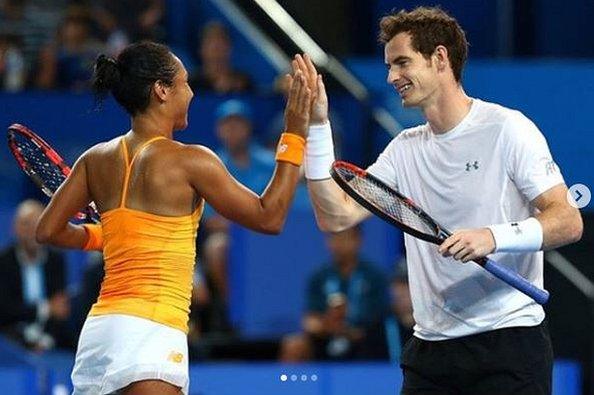Andy Murray: The moment former British number one knew the game was up
- Published
- comments
Andy Murray was in tears as he told journalists next week's Australian Open could be his last tournament
It was just before Christmas, during his traditional pre-season training camp in Miami, when Andy Murray realised the game was up.
The optimism expressed in the early part of the year had long since faded. A run of tournaments in August on American hard courts put enormous strain on his right hip, which had been improved, but by no means healed, during January's surgery.
Painstaking rehabilitation followed: on the treatment table, in the water, in the gym. But when the time came to move through the gears on court in Florida in December, the pain was too intense.
That was the moment Murray told his coaching team that his condition had become too debilitating. He set Wimbledon as a target for a final appearance, which seemed achievable to him then, but perhaps less so now after his return to the tour in Brisbane last week.
There are no further options for Murray. He is actively considering a second surgery to resurface his hip, but that would be to improve quality of life rather than to extend his career.
He has been in regular contact with the 23-time Grand Slam doubles champion Bob Bryan, who also had hip surgery last year. The American has made a comeback this month, but Murray says he has no interest in pursuing a career exclusively in doubles.
Wimbledon would be the most fitting stage for the send-off Murray so enormously deserves. But he does not sound at all sure he can put his body through another six months of distress. And if he does, but presumably restricts his appearances, would he want to risk a potentially heavy defeat while limited to a ceremonial role in a championships he has won twice?
The decision will be made after his involvement in the Australian Open comes to an end, and so Monday's first-round match against Roberto Bautista Agut could be where the story ends.
What a huge void he will leave in the British sporting landscape. Murray has been not only phenomenally successful, but consistently entertaining and with the perennial ability to conjure up a dramatic storyline. He has been consistently thought-provoking, too, and often prepared to challenge conventional thinking.
Murray has always been extremely popular among his peers and is seen as something of an icon in the women's locker room for his support of the WTA Tour and gender equality. When sexism needs to be called out, Murray is usually the man to do so.
American legend Billie Jean King thinks his "greatest impact on the world may be yet to come", and the British number one Johanna Konta is sure Murray will remain a "vocal presence in trying to push equality forwards".
When Andy Murray was a 14-year-old tennis star of the future
The warmth of the tributes is heartfelt, as Murray has regularly gone out of his way to help and encourage fellow competitors.
He often takes the opportunity to watch a live stream of up-and-coming British players competing on feeder tours, and has been hugely supportive and influential to players like Kyle Edmund and Dan Evans.
Even Katie Boulter, nine years his junior, received a congratulatory text when she broke into the world's top 100 for the first time in October. As Boulter said: "He didn't have to do it but the fact that he did shows so much about him and his personality."
Murray has inspired the next generation, but we should not expect them to be able to fill such illustrious boots.
Britain has five singles players in the top 100 and it seems fitting, although also somehow bittersweet, that 23-year-old Cameron Norrie chose the day of Murray's announcement to reach his first ATP final.
And you suspect that, despite a desperately difficult and draining day, Murray may have still found time to send his congratulations.

British number two Heather Watson said Murray had a heart of pure gold, adding: "You're most definitely one of the most liked and respected players on the tour. I know all of us girls in the locker room are in awe & so grateful for how you always fight in our corner! Thank you so much for that".
